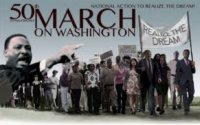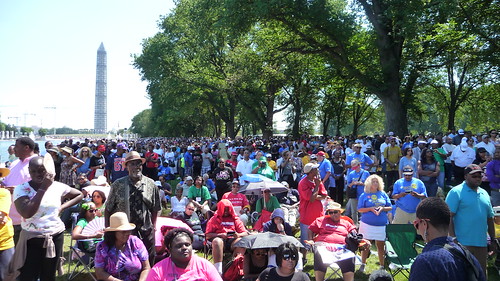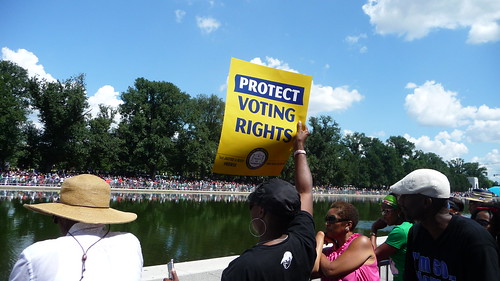Reflections on the 50th Anniversary of the March on Washington

KFTC sent a delegation of 11 people to participate in the 50th anniversary of the March on Washington for Jobs and Freedom. They traveled with a group of about 100 Kentuckians on buses organized by the Kentucky Alliance Against Racist and Political Repression. These reflections and photos are from one member who made the trip.
Fifty years have passed since the March on Washington for Jobs and Freedom, when Martin Luther King Jr. famously bellowed, “I have a dream” here on the steps of the Lincoln Memorial where I now stand.
There are deeply eroded grooves on each marble step, worn and weary from the footsteps of previous generations who likewise marched for equality. From the 1913 Women Suffrage Parade to the Prayer Pilgrimage for Freedom in 1957, these steps have become sacred ground for the forgotten, neglected, and disenfranchised citizens of our nation.
Now here we stand, honoring the legacy of Dr. King, Medgar Evers, James Chaney, Michael Schwerner, Andrew Goodman, and others who sacrificed their lives so that my generation could freely go to the polls on Election Day and attend integrated schools.
In this crowd of tens of thousands, we acknowledge that while there have been great strides in the ongoing fight for racial justice, there are remnants of prejudice that prevent Dr. King’s dream from being fully realized.
I press through the masses of people gathered around the reflecting pool to get a glimpse of the speaker behind the podium. The first person whose voice I hear booming from the Memorial steps is that of Cory Booker, mayor of Newark, New Jersey and candidate for U.S. Senate.
“When we still have a justice system that treats the economically disadvantaged and minorities different than others, we still have work to do,” Booker cried. “When you can, in America, work a full-time job plus overtime and still be below the stifling line of poverty, we still have work to do. When the rich are getting richer and the poor are getting poorer. When millions of our children are living in neighborhoods where their soil is toxic and their rivers are polluted and their air quality is so poor that asthma is epidemic, we still have work to do!”
The words are loud and honest.
Standing in this field, I see before me a multitude of faces. People whose dreams reach far beyond the minimum wage can offer. Indeed, there is still work to be done.
Labor unions carry placards that read, “Jobs Not War!” Immigration reform advocates proudly display handmade posters: “No person is illegal!” Fairness advocates wave rainbow flags and Spanish-speaking marchers shout, “Sí, se puede!”
An important principle I’ve learned from being a member of KFTC is that there exists an intersection where issues of social, environmental, and economic justice meet. Here in this muggy field, I find myself at such a juncture: surrounded by high school teachers, congregation leaders, citizen journalists, gun violence victims, former felons, war veterans, elders, babies, and the American flag.
However, the streets of D.C. reveal the ongoing problem of racism, which is made visible in the slogans, t-shirts, and handmade signs demanding justice for Trayvon Martin and an end to the mass incarceration of African American youth.
We live in a time of imprudent colorblindness, where the Supreme Court can render key provisions of the Voting Rights Act unconstitutional because, according to Chief Justice Roberts, it's “based on 40-year-old facts having no logical relationship to the present day.”
We inhabit in a culture of victim blaming, where a person can be profiled, followed, and murdered due to misguided interpretations of Stand Your Ground laws.
We perceive our world through the lens of a broken justice system, where African American males statistically receive longer prison sentences for first time offenses than their white counterparts.
We exist in a society where this has become the norm.
When Dr. King and John Lewis stood on these steps half a century ago, the stakes were high. They returned to Alabama, prepared to face the harrowing dangers of Southern bigotry, yet they continued to organize political demonstrations across the country and pushed Congress into finally taking action.
The sun is mercilessly scorching as it reaches its zenith. I manage to find shade beneath a giant tree where a group of Georgia college students are standing.
The words of mayor Booker permeate the audience as he tunefully continues the refrain, “We still have work to do!”
Fifty years later, on a march to fulfill a Dream, I place myself in the footnotes of history, in the ongoing struggle for justice that continues to unfold on these memorial steps.
“We can’t sit back now thinking democracy is a spectator sport, when all we can do is watch our TV screens and cheer for our side,” Booker proclaims as we roar into applause. “Democracy demands action!”
The crowds around me start chanting, “We still have work to do!”
Elijah is a freelance journalist and has been an active member of KFTC for nearly two years. He received his bachelor's degree from the University of Louisville in 2013 and continues to write for various news publications, covering issues surrounding social and economic justice.
Recent News
Kentucky’s past legislative session showed alarming trend toward government secrecy
Churchill Downs takes more than it gives. That's why the Kentucky Derby is a no-go for me
‘We must never forget.’ Kentucky town installs markers for lynching victims.
Featured Posts
Protecting the Earth
TJC Rolling Out The Vote Tour – a KFTC Reflection Essay
KFTC Voter Empowerment Contractor Reflection Essay
Archives
- Home
- |
- Sitemap
- |
- Get Involved
- |
- Privacy Policy
- |
- Press
- |
- About
- |
- Bill Tracker
- |
- Contact
- |
- Links
- |
- RSS





Add new comment